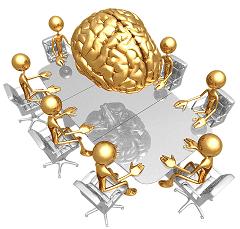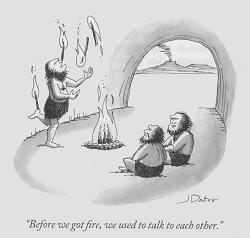
My smart phone can let me access the collective knowledge of humanity from almost anywhere, but is that access making me smarter or simply less focused? Every day I see people texting while in line at a store, using their laptops in parks, or chatting on the phone to loved ones while they walk. No matter where we go, we seem to stay plugged in. And while plugged in, we consume. According to the New York Times, Americans took in three times as much data in 2008 as they did in 1960. We multitask, trying to absorb different media streams (Twitter, email, Facebook, etc) at once, and new evidence shows that multitasking isn’t simply making us more efficient, it’s also making us more stressed, and less discerning. It seems possible our brains may have a practical restriction to how much data they can and should process. Is the growing digital age doomed to fail due to our own mental limits? No, but we need to acknowledge the necessity and benefits of unplugging.
I’ve been having an ongoing debate with a good friend about modern information overload. Should we be concerned, he asks, that we’re exposing our brains to such large volumes of data? No more, I replied, than we should have been concerned with the advent of the printing press, or the radio, or the TV. Each new advance in media brings about a concern about the loss of social interactions, the decaying of our brains, but on whole we have learned more and grown in technological strength and understanding. Ignore the Luddites and learn to love being plugged in.
Then I was pointed to Matt Richtel’s excellent Pulitzer Prize winning series in the NY Times, “Your Brains on Computers” which explores how our minds are shaped by the data stream. Richtel and his colleagues talk with scientists and scholars about the way in which we respond to multitasking and a glut of information. He points out research at Adam Gazzaley’s Lab at UCSF that indicates multitaskers have a harder time ignoring irrelevant information. Other scientists have found that anticipating incoming messages keeps you stressed even while not working. Checking emails can literally be addictive complete with associated chemical changes in our brain. A NY Times poll found that 30% of younger Americans think that technology makes it harder for them to focus, that 1 in 10 Americans find technology makes them less likely to interact with their children, 1 in 7 say it makes them less likely to spend time with their spouse, and 1 in 3 think they can’t live without being plugged in.

The history of techno-optimism versus techno-pessimism is long, probably dating back to those who feared the wheel would lead to less time spent in the cave with the family. Yet modern concerns have been matched with increased insight from neurology and behavioral science. You can get an interesting overview of that recent history in this article by Adam Thierer. The plasticity of the brain is impressive, we are creatures designed to adapt. Adjusting to new levels of technology isn’t always easy, but it can be done.
Recently Richtel discussed his NY Times series with NPR. He brought up an analogy, not originally his, that I think serves us well. Information flow is like food. If you think all food is good, if you consume indiscriminately, then you will likely have health problems. Just as we need to learn how to eat healthy, we also need to learn how to manage our data streams in healthy ways. Because our understanding of how the brain processes data is still being developed we may not be able to form definitive guides to the modern information age. No one can really tell you that X hours of email per day is ok, but Y minutes on Facebook leads to poor reasoning skills. It is apparent, however, that unplugging from the internet, removing yourself from all distractions, is beneficial. Richtel took a team of scientists on a rafting trip away from all connectivity. Even the skeptics noticed a profound difference in their own behavior after a few days unplugged. We seem to have a finite amount of ‘working memory’ in our brains, removing distractions may allow deeper thoughts and reasoning to use working memory taken up by information overload.
In his NPR interview, Richtel is quick to point out that the increased consumption of information isn’t a bad thing. No, it’s an essential tool in our developing world. He doesn’t think we should end our hunger for new data, just manage it.
I agree. We recently ran a story on how exercise boosts your brain’s health. Going out for a jog is good for your mind. So too, it seems, is unplugging from the internet. I propose, and I am far from the first to do so, that we include ‘removing distractions’ alongside exercise as a fundamental component of our mental health. Are you giving yourself an hour each day to go out and run around? Why not include an hour when you turn off all your media (phones, computers, TV, etc) and relax. Don’t sleep, don’t read a book, just look around, think, and talk to people. Every once in a while, go on vacation and do the same thing, but for a few days. Does it sound completely boring? Well, boring can be a good thing.
We need to figure out how to maximize our adaption to new technology because that technology is growing in scale quickly. Many of us are already part of at least one social network, and those come complete with their own series of alerts, updates, and reminders. Imagine the information you’ll have to absorb as billions of people around the world start to go online in the upcoming decades. Think of how much we’ll have to process as our homes, cars, and offices start to create their own data streams. If we don’t learn how to interface properly with that new flow of content then we’ll end up nervous wrecks – constantly waiting for the next email or poke or tweet, unable to focus on our work or our personal lives. We could become people too distracted to function.
Yet the other possibility is equally powerful: if we learn how to manage data well, we could become enhanced beyond anything humans have ever experienced before. Imagine a time when an answer, any answer, can be found in seconds no matter where you are. Think of a time when you can interact with anything you own, or anyone you know, as easily as you can speak. With smart phones we seem to be halfway there already. The massive flow of data I’ve been discussing is a necessary byproduct of interconnectivity. If we can manage the data well then we’ll be able to link humanity together in ways that will increase productivity, understanding, and creativity.
Doing so means adjusting to the new onslaught of data. Right now the recipe for adjusting is unclear but probably includes “eat well, exercise well, and relax often.” Perhaps unsurprisingly that’s pretty much the recipe for longevity as well. As neuroscientists explore the brain we may be able to better design the flow of data to optimize our mental performance. We may find that productivity is maximized when we check emails three times a day, when we only have four windows open on our screens at once, or if we limit texting to times when we’re not driving. Until we have that precision guiding our online behavior, it’s up to each of us to figure out how best to plug into information technology. But take my advice: prioritize down time. Enhancing your mind sometimes means knowing when to give it a break.
[image credit: Gazzaley Lab, New Yorker]
[source: NPR, NY Times, Tech Liberation]


